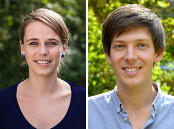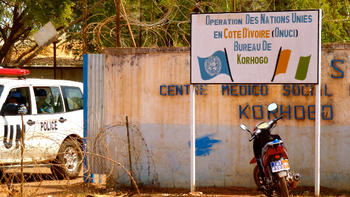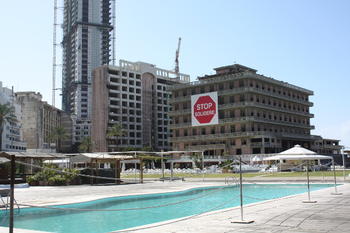The Politics of State- and Security-Building in Côte d’Ivoire and Lebanon
The Regional Office of the UNOCI in Korhogo, Côte d'Ivoire
A sign at the famous St. George Hotel protesting against the reconstruction project of post-war Beirut and the company running it, both known as "Solidere" (Beirut)
News from Jul 14, 2015
The SFB Research Project C6 seeks to examine the complex interactions between international and local actors and analyzes how power relations and politics at the domestic level change as a result of international state-building efforts. We focus on the cases of Côte d’Ivoire and Lebanon, looking specifically at international assistance to the security sector and to the reform of political institutions. Both countries are marked by a fragile political order, sociopolitical cleavages and a long-standing presence of the international community.
In early 2015, research associates Tilmann Scherf and Sina Birkholz embarked on their field research to Côte d’Ivoire and Lebanon respectively to map the field of international state-building assistance. They each conducted qualitative interviews with more than 30 international and domestic experts and representatives from the security- and governance sector, including the UN institutions, foreign embassies, the national security forces, civil society and academia.
Côte d’Ivoire
Long regarded as a model for political and economic stability in West Africa, Côte d’Ivoire has seen continued violence since the start of a protracted civil war in 2002, which has left the country divided along ethnic and identitarian lines into a rebel-held North and a state-controlled South for almost a decade. After contested elections in 2010, heavy fighting erupted once again, leading to the ousting of President Laurent Gbagbo and the establishment of a new government led by President Alassane Ouattara in 2011. The United Nations Operations in Côte d’Ivoire (UNOCI), established in 2004, is mandated to monitor a fragile peace and support the new Ivoirian government with the implementation of its national SSR (security sector reform) and DDR (disarmament, demobilization and reintegration of combatants) strategies. UNOCI is supported by other international agencies (UNDP, GIZ, USAID, etc.) which implement externally-funded projects in Côte d’Ivoire, most notably in the field of police reform, DDR and democratic institution-building.
Tilmann’s field research has greatly benefitted from practical experience and information exchange with a variety of actors in Côte d’Ivoire. In the eyes of many, the presence of the international community has a positive effect on the general security situation in the country. However, peace remains fragile, as the Ouattara government still relies strongly on the calming effect and stabilization efforts of the presence of the international community. Supporters of the ‘old regime’ protest against alleged ‘victor’s justice’ exercised by the new government. The uncertainty around the status of ex-rebel fighters remains another security concern, as many of them await reintegration into the republican security forces. Counterbalancing these pressures from both sides will remain a tightrope act for the Ouattara government in the run-up to the Presidential elections in October 2015.
Tilmann has also participated in an academic workshop at Université de Bouaké and joined in a one-week UN field mission to northern Côte d’Ivoire.
Lebanon
This year, Lebanon commemorated the end of a 15-year long protracted civil war that was characterized by a sequence of different phases and conflict constellations, and (formally) came to a closure with the Taif Agreement in 1989. Establishing the foundations of the post-war political order, Taif also sanctioned Syrian ‘tutelage’ over Lebanon, resulting in a de-facto control of politics and security by the Syrian regime. The murder of (former) Prime Minister Rafiq Hariri and the ensuing ‘Cedar Revolution’ in 2005 led to the withdrawal of Syrian forces and fuelled hopes for a new beginning. Yet, instead of the emergence of a national consensus on the country’s identity and trajectory, the past 10 years have seen repeated political deadlock and episodes of violence, the reinforcement of sectarian and class divisions, along with a surprising resilience of the political system and the country as a whole. The most recent test to Lebanon’s stability has been the regional turmoil since 2011 and the Syrian war, with the number of Syrians seeking refuge in Lebanon amounting to more than one million.
After the civil war, the UN, the EU, its member states and the US have repeatedly stepped up their support to institution-building in response to aforementioned turning points. Since about 2005/6 a considerable part of this external assistance goes to the state security forces. Sina’s field research aimed at producing insights into what kind of projects external actors have been focusing on in the fields of governance reform and security sector assistance, and how they try to achieve their goals. By talking to both donors and beneficiaries, expats and Lebanese, she tried to gain an understanding of mutual perceptions, practices of collaboration and competition, and engage critically with the narratives that are produced around the security-development sector.
During her research stay, Sina has benefited greatly from her affiliation with the Orient Institute Beirut (OIB). She was granted access to OIB’s internal research colloquia and the OIB’s library. The exchange with the community of OIB scholars has provided strong support to Sina’s research.
Both field trips have yielded important results for the C6 project’s research agenda. In the two countries examined, international state-building assistance is strongly shaped by state-society relations that are pervaded by either neopatrimonial (Côte d’Ivoire) or confessional (Lebanon) lines of influence. Specific forms of patron-client relations have been decisive in structuring the outcomes of international state-building processes – outcomes, which can be described as ‘mixed’ at best. In some cases we found that international assistance has involuntarily served to strengthen and ‘transnationalize’ local dynamics of favoritism and patron-client relations. These insights have provided the C6 agenda with important new directions for future research.
 |
About the authors: Sina Birkholz and Tilmann Scherf are research associates with Research Project C6. They investigate the role of international actors in Security Sector Reform and (re-)establishing national political institutions in areas of limited statehood in the Middle East and West Africa. |


